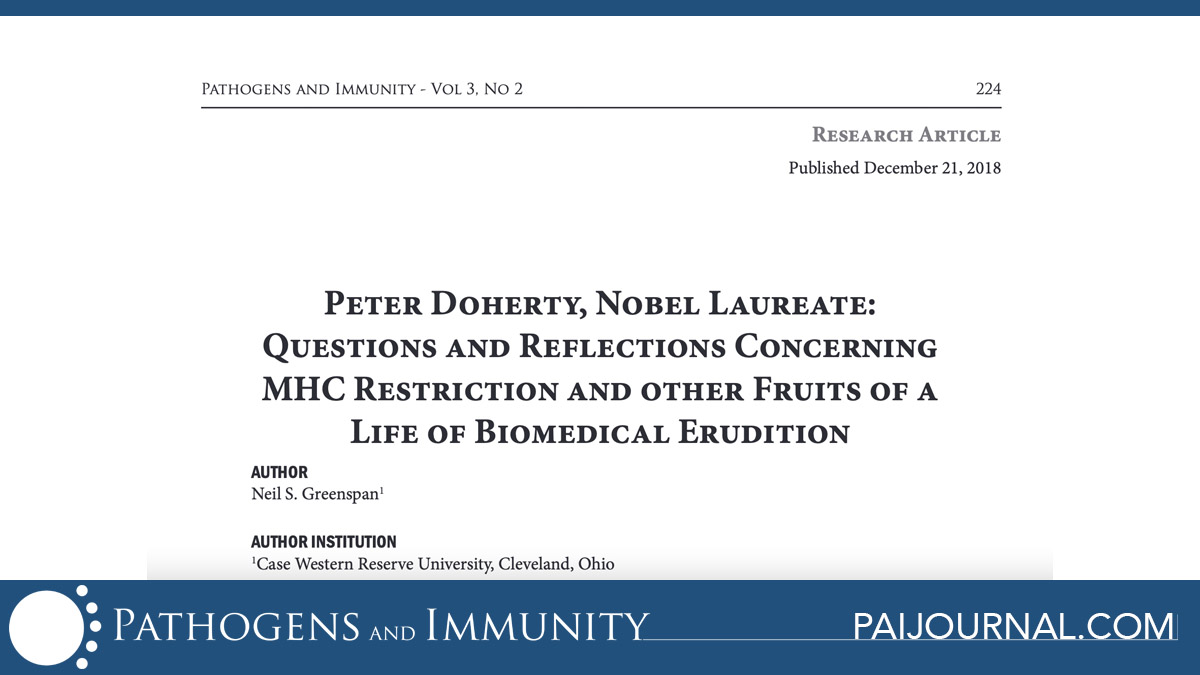Expert Exchange Interviews
David Baltimore, PhD, reflects on his contributions to biomedical science, which have had a major influence on the fields of molecular biology, virology, cancer, and immunology.
Dr. Arturo Casadevall shares insight into his childhood, what motivated him to go into biomedical research, the impact of the AIDS epidemic, and the lessons learned that he imparts to younger scientists.
In this interview, Vishva Dixit, MD, talks with Neil S. Greenspan, MD, PhD, senior editor of Pathogens and Immunity aboutwhat his career in science has revealed about biology in humans, but also what it has revealed about how to be successful in science. Dr. Dixit is a world-famous immunologist and biochemist who has made major contributions to the study of innate immunity in general and particularly to understanding inflammasome activation. He is vice president and senior fellow in physiological chemistry at Genentech

Peter Doherty, PhD, talked with PAI Senior Editor Neil Greenspan, MD, PhD, about the landmark article he and Rolf Zinkernagel published in Nature that described the ability of lymphocytic choriomeningitis virus (LCMV)-specific cytotoxic T cells to lyse LCMV-infected, 51Cr-labeled target cells if the target cells shared class I major histocompatibility complex (MHC) molecules with these T cells.
In this interview, Dr. Anthony Fauci, who was, until recently, the director of the National Institute of Allergy and Infectious Diseases at the National Institutes of Health, discusses the national response to the HIV/AIDS pandemic. He was the principal architect of the President's Emergency Plan for AIDS Relief, known as PEPFAR, that has saved millions of lives throughout the developing world by assuring access to life-saving antiretroviral therapies. In recent years, he's been the voice of our national response to SARS, Ebola, and COVID, and throughout this Dr. Fauci has led a large basic and translational immunology research laboratory, The Laboratory of Immunoregulation, which has revealed a trove of insights about HIV pathogenesis.
In this interview, Dr. Erica Ollmann Saphire discusses how structural biology informs antibody drug development against COVID-19, in a sneak preview of her Keynote Address at the Keystone Symposia on “Antibodies as Drugs,” which takes place April 27-30, 2022.
>>Watch the Interviews: Part 1 and, in this second part Dr. Ollmann Saphire shares how her work on hemorrhagic fevers prepared her, and the world, for a rapid response to COVID-19.
*Video produced as a collaboration between Pathogens and Immunity and Keystone Symposia.
Dr. Raymond Schinazi talks about his career with Dr. Michael Lederman and Dr. Neil Greenspan, senior editors of Pathogens and Immunity. Dr. Schinazi has invented numerous powerful antiviral agents including the antiretrovirals lamivudine (3TC) and emtricitabline (FTC) and the anti-hepatitis C agent sofosbuvir. These agents have saved millions of lives, and here, Dr. Schinazi talks in detail about how these agents were invented, how they work, how they are being applied and offers his thoughts about newer approaches to treat viral infections.
In this interview with Pathogens and Immunity (PAI), Dr. Julie Segre, researcher for the National Human Genome Research Institute and expert in the field of skin biology, discusses the influences that formed her scientific career and the link between her background in mathematics and molecular biology.
She shares her experience developing the human genome project and how she evolved into studies focused on the microbiome and its impact on health and skin disease with PAI’s senior editors, Mahmoud Ghannoum, PHD, and Robert A. Bonomo, MD.
She says she enjoys transitioning into new areas of research and pairing her expertise with the expertise of colleagues to ask new questions. “I am comfortable being uncomfortable,” she says. As part of being a “good scientific citizen,” she says thinking about the translational aspect of how research will advance care is an important consideration when devising a study. “Don’t just think someone else will pick this up and try to communicate the findings,” she says, adding that she finds herself focusing now on collaboration, how to build and maintain scientific community, as well as how to communicate ideas. “I do believe that the community is stronger than each of us as individuals,” she says.
>>Watch the Interview.
*Video produced as a collaboration between Pathogens and Immunity and Keystone Symposia.
In this interview, Dr. Drew Weissman talks with Michael M. Lederman, MD, and Neil Greenspan, MD, PhD, senior editors of Pathogens and Immunity, about his work exploring the use of messenger RNA (mRNA) to drive heterologous gene expression in human cells and the application of his findings to vaccine development and gene therapy. Dr. Weissman received the 2023 Nobel Prize in Physiology or Medicine together with Katalin Karikó, PhD. His work has revolutionized immunization technology and allowed for the production of the most effective vaccines to prevent COVID-19.
In this interview, Jonathan Yewdell talks with Pathogens and Immunity senior editor Neil Greenspan about the evolution of viral immunology, highlighting his work and the contributions of other influential scientists. He emphasizes the importance of passion and collaboration in scientific research, illustrating the potential for groundbreaking discoveries through networking. He provides advice on navigating a scientific career, stressing the significance of strong mentorship. And he shares his perspective on transforming the scientific publishing industry and research education.
